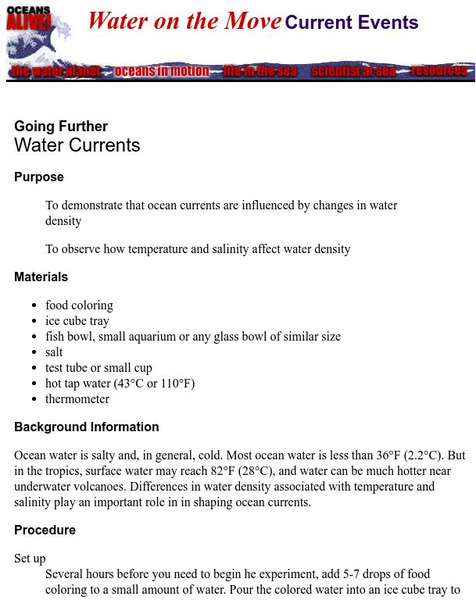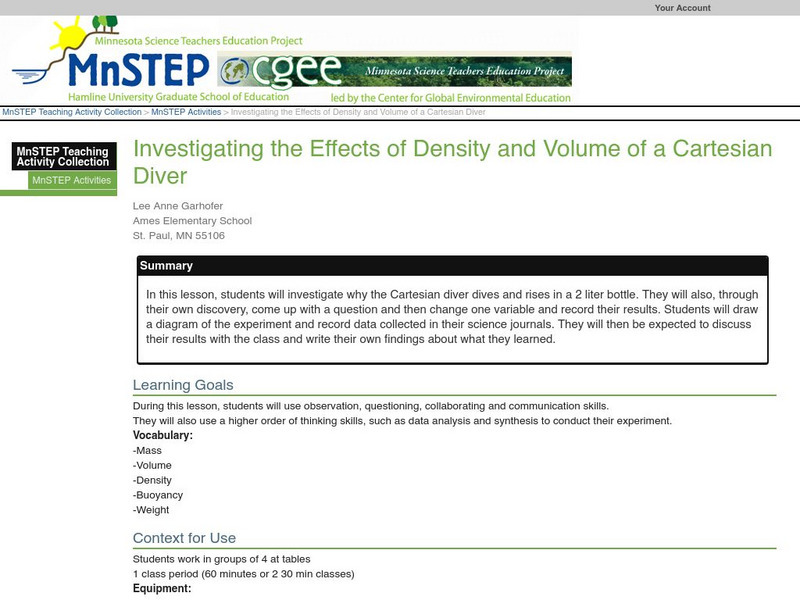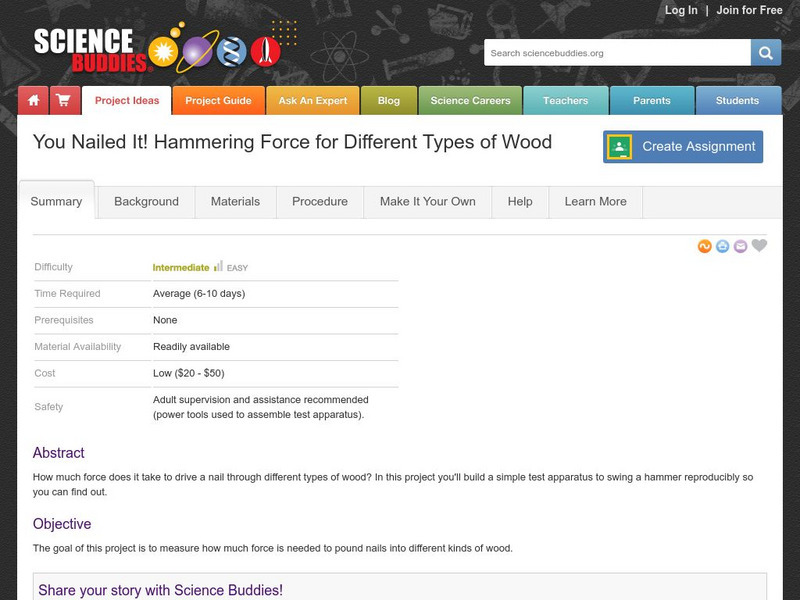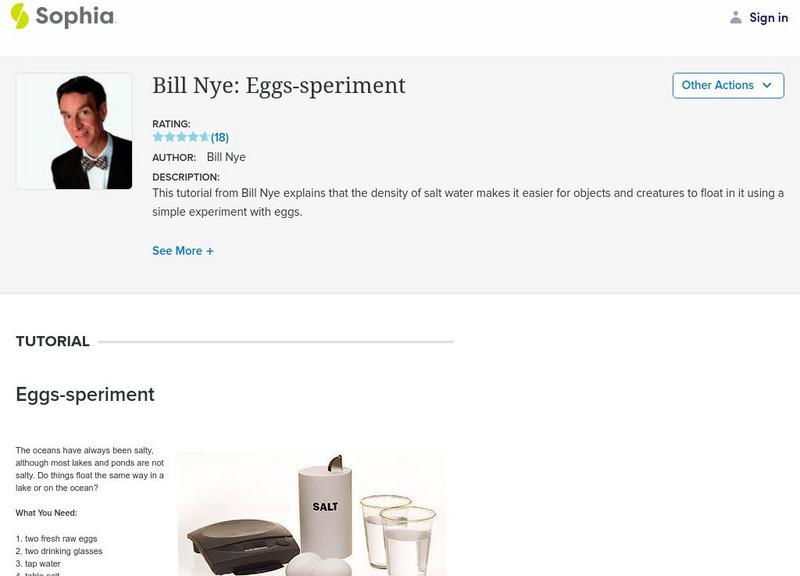Hi, what do you want to do?
Curated OER
Chesapeake Bay Population Studies
Students determine how to use a quarter meter quadrant to find population density, relative density, frequency and how to calculate a diversity index while participating in a virtual field trip. They study how to establish a Correlation...
Curated OER
Size Per Unit
Fifth graders investigate how to find the average and the concept of a per unit quantity and its applications. They also make connections of using population density and how to find the speed with its relating formula. This is bringing...
Curated OER
Graphing Your Motion-Day 1
Ninth graders explore the concepts of motion, velocity and acceleration through graphing their own movement using LoggerPro. They become more familiar with the computer technology. Students explore graphing in real time and graph on...
Curated OER
Biotechnology
High schoolers are introduced to the topic of biotechnology. Using the internet, they research issues that have been improved or brought about because of biotechnology advancements. In groups, they participate in activities in which...
Curated OER
Acid and Bases - Alien II
Eighth graders determine which of two solutions is more acidic by adding each to a given base. Students have to apply this analysis process to a problem scenario involving an alien creature.
Curated OER
Finding and Collecting in the Field
Students examine the types of plants brought over to America from immigrants. They research how some of these types of plants cause damage and alter the landscape. They record data and share the information with the community.
Curated OER
Milk: A Practical Application
Students examine the impact of the physical and chemical properties of milk and its use as an important food.
Curated OER
Masses and Weights
Young scholars explore the concept of weight and mass and the importance of units. Using a balance, they determine the weight of various objects in the unit of "pebbles" and in grams.
Curated OER
The Drag of Drag
Students are introduced to drag. Then they summarize drag by saying that the drag is proportional to the square of the velocity. Students then solve problems an example of such a problem: Explain why swimming underwater is faster than...
Curated OER
How Does Water Cool?
How fast does water cool? First fifth graders will draw a line on a graph that predicts how fast they think water can cool from boiling. Then they plot the actual data on the same graph to see if their estimate was correct.
Teach Engineering
Buoyant Boats
Eureka! Using the clay boats made in the previous lesson, learners investigate the idea of buoyancy and water displacement to finish the last installment of five in a Floaters and Sinkers unit. Their observations during the activity...
Curated OER
Social Studies: Population Distribution
Students create a population distribution map of Goodland Island indicating where people live by marking the locations with dots. After reading a written description of the island, they write short paragraphs explaining and justifying...
Curated OER
The Impact of Invention
Students explore the impact of invention. In this invention instructional activity, students examine how inventions are on going and affect all aspects of life in both good and bad ways. Students will research the history of invention,...
Curated OER
Comparing Earth and Mars
Students work together to compare and contrast Mars and Earth. Using the internet, they answer questions given to them by their teacher and calculate answers showing their work. They graph their answers and discuss the results of the...
Curated OER
The Appaloosa - Horse of the Nez Perce
Fourth graders investigate the use of Appaloosa horses by the Nez Perce Native Americans during the War of 1877. They examine the geography of the area and determine why the Appaloosa horse was suited to this use after looking at...
Science Bob Pflugfelder
Science Bob: A Density Experiment You Can Drink
Science Bob provides instructions for a density experiment you can drink using common supplies with information on how it works.
Museum of Science
Museum of Science: Water Density Experiment
A simple lab activity to demonstrate that ocean currents are influenced by changes in water density.
Science Buddies
Science Buddies: It's Crowded in Here! A Study of Plant Population Density
Like humans, plants can be negatively affected by overcrowding. Unlike humans, plants cannot get up and move to a new environment or explore how to utilize new resources. This experiment will explore the effects of crowding (population...
Science Buddies
Science Buddies: Project Ideas: How Much Sugar Is Really in That Soda?
In this science fair project, use a precision hydrometer to measure the amount of sugar in soda. The Science Buddies project ideas are set up consistently beginning with an abstract, objective, and introduction, followed by a section on...
Science Buddies
Science Buddies: Project Ideas: What Makes Foams Stand Up Straight
In this food science fair project, students will determine which foods make good edible foams, with high volume and longevity. The Science Buddies project ideas are set up consistently beginning with an abstract, objective, and...
Science Buddies
Science Buddies: Buoyancy of Floating Cylinders
This project presents an interesting puzzle. A disk of wood will float face-up, that is, with its circular cross-section parallel to the surface of the water. A long log of wood, however, floats with the circular cross-section...
Science Education Resource Center at Carleton College
Serc: Investigating the Effects of Density and Volume of a Cartesian Diver
In this lesson, students will investigate why the Cartesian diver dives and rises in a 2 liter bottle. They will also, through their own discovery, come up with a question and then change one variable and record their results. Students...
Science Buddies
Science Buddies: You Nailed It! Hammering Force for Different Types of Wood
This Science Buddies project explains how to build a mechanism that will reproducibly swing a hammer so you can determine the amount of force needed to hammer a nail through various densities of wood. The Science Buddies project ideas...
Sophia Learning
Sophia: Physics: Bill Nye: Eggs Speriment
Created to teach students of the 21st century, SOPHIA is bringing science straight to your fingertips. Become the commander of your own learning experiences as you take part in this density experiment.




























